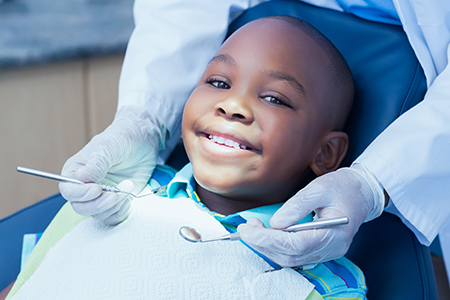Se habla español | We treat emergencies
1250 W. Lake St, Unit #20, Addison, IL 60101Se habla español | We treat emergencies
1250 W. Lake St, Unit #20, Addison, IL 60101
At Addison Dental Studio, we believe childhood is the ideal time to build confident, healthy smiles that last a lifetime. Our pediatric care is designed to be proactive, practical, and approachable — helping parents and caregivers understand not just what to do, but why it matters. We focus on prevention, gentle treatment, and clear communication so children feel safe and families leave informed.

Healthy habits begin at home and are reinforced in the dental chair. Early visits give children an opportunity to get comfortable with dental staff and routine care, which reduces anxiety and fosters cooperation as they grow. We emphasize simple, repeatable routines parents can use to keep teeth and gums strong from the infant stage through early childhood.
Preventive services — such as professional exams, cleanings, and targeted guidance — let us catch small concerns before they become larger problems. During regular visits we review brushing technique, offer age-appropriate recommendations for oral hygiene tools, and walk caregivers through ways to make oral care a positive part of daily life rather than a chore.
We also discuss early habits that influence oral health, including pacifier use, thumb-sucking, and safe bottle practices. These conversations are practical and tailored to your child’s stage of development so families can make informed choices that protect smiles while supporting healthy emotional growth.
Consistent checkups allow our team to monitor dental development and spot patterns that can affect a child’s long-term outcome. Regular assessments let us track tooth eruption, bite alignment, and the condition of soft tissues — information that helps guide timely interventions and avoid unnecessary treatment later on.
At each appointment, we perform a focused clinical exam and offer preventative care customized to your child’s needs. When appropriate, we use digital radiography to evaluate areas not visible on the surface; these images are used judiciously and only when they will change the course of care, ensuring conservative and thoughtful management.
A routine cleaning removes plaque and helps teach children the sensation of a professional visit. We combine hands-on instruction with encouragement so children understand how daily care supports what we do in the office, creating a collaborative routine between home and the dental practice.
Tooth decay is common, yet largely preventable with consistent habits and timely preventive treatments. We discuss realistic approaches to reduce sugar exposure, encourage water-first beverage choices, and suggest snack patterns that protect enamel. Small changes in timing and selection of foods can make a measurable difference in cavity risk.
For many children, we recommend protective measures like fluoride varnish and dental sealants at the appropriate age. Sealants provide a thin, pain-free barrier on the biting surfaces of new permanent molars, while fluoride strengthens enamel and helps teeth resist decay. These options are explained clearly so caregivers can weigh their benefits.
Making toothbrushing a positive, routine activity is essential. We offer tips for turning brushing into a game, using timers, or choosing child-friendly brushes and toothpaste. Our goal is to create a sustainable routine that supports oral health without adding stress to family life.

Infant oral care starts before teeth appear and continues through the eruption of primary teeth. We encourage parents to begin cleaning gums with a soft cloth after feedings and to introduce an age-appropriate toothbrush once teeth emerge. Early habits promote a lifetime of better dental health and can reduce the risk of early childhood decay.
Teething is a normal developmental phase and can be uncomfortable for little ones. Safe, simple measures — such as chilled teething rings or gentle gum massage with a clean cloth — can provide relief. If concerns about fever, excessive fussiness, or prolonged symptoms arise, our team can advise on the best next steps.
The American Dental Association and the American Academy of Pediatric Dentistry recommend that children have their first dental visit around the first birthday or within six months of the first tooth appearing. That early visit is brief and friendly: we check development, discuss feeding and hygiene, and help families establish a long-term care plan.
Positive experiences build confidence. Our office emphasizes a welcoming environment, calm communication, and age-appropriate explanations so children understand what to expect. We use gentle techniques and clear language to reduce fear and help kids feel in control during their appointments.
Every child is unique — some adapt quickly while others need a bit more time and reassurance. We collaborate with caregivers to create an individualized approach: stepwise introductions to the chair, distractions for nervous children, and supportive coaching that empowers both child and parent.
For children with special healthcare needs or heightened dental anxiety, we discuss a range of options to ensure safe, respectful care. Our focus is always on comfort, safety, and achieving the best possible oral health outcome while minimizing stress for the child and family.
Begin dental visits early to establish familiarity and monitor growth
Use gentle, age-appropriate brushing for babies and toddlers
Avoid putting infants to bed with bottles containing milk or juice
Bring children in for routine exams and professional cleanings as recommended
Set a positive example by practicing good oral hygiene together
Choose tooth-friendly snacks and limit sugary beverages to protect enamel
Support weaning from pacifiers and thumb-sucking at appropriate developmental stages
Use a properly fitted mouthguard when children participate in contact or high-impact sports

As children enter school and adolescence, their oral health needs evolve. We watch the transition from primary to permanent teeth, assess space and alignment, and guide families on timing for any necessary orthodontic evaluations. Addressing developing problems early can simplify future treatment and enhance outcomes.
Teen years bring new challenges — sports, braces, busy schedules, and dietary changes. We discuss strategies to maintain oral hygiene with braces or aligners, recommend protective mouthguards for athletes, and offer targeted advice to limit habits that can harm teeth or gums.
We also support families in planning preventive measures like sealants for new permanent molars and periodic fluoride applications when they add meaningful protection. Ongoing care during the school years sets the stage for a healthy adult smile.
Facial growth and jaw development are part of routine evaluations. We look for signs that orthodontic consultation may be beneficial — such as early crowding, crossbites, or significant changes in jaw relationship — and discuss timing so families can make proactive decisions about care.
Not every child needs early orthodontic treatment, but periodic monitoring helps identify the right window for intervention when it will be most effective. When braces or other appliances are recommended, we coordinate with orthodontic specialists to ensure comprehensive and well-timed care.
Nutrition plays a foundational role in oral health. A balanced diet rich in vitamins and minerals supports tooth and jaw development, while frequent consumption of sugary or sticky snacks increases cavity risk. We provide practical tips for choosing snacks and beverages that support growth and protect teeth.
Encouraging regular water intake, limiting between-meal sugars, and creating consistent meal and snack patterns are achievable steps that pay off over time. We tailor suggestions to each family’s lifestyle so diet-related changes are realistic and sustainable.
At Addison Dental Studio, our pediatric dentistry approach blends prevention, comfort, and clear guidance so families can confidently support their child’s oral health. If you’d like to learn more about our pediatric services or discuss your child’s individual needs, please contact us for more information.
A pedodontist is a dentist who has received advanced specialty training in meeting the dental needs of children from infancy to adolescence. Pedodontists, also referred to as "pediatric dentists," study child psychology, behavior management, caring for children with special needs, methods of handling oral/facial trauma, and various techniques for providing anesthesia and sedation. Pedodontists also understand the complexities of facial growth and development and have the clinical skills required to meet the dental needs of all children at every stage of development. Most of all, pedodontists are passionate about what they do and enjoy working with children. They strive to make every dental experience a positive one as they help children establish a strong foundation for good oral health.
Even before your child is born, their first set of teeth is already forming. In fact, by one year of age, some of your baby's front teeth will have already come into place. While the arrival of your baby's first teeth is only one of many developmental milestones, it represents an excellent time to begin a program of oral care. According to recommendations from the American Dental Association, babies should see the dentist around the time of their first birthdays.
Your baby's first teeth typically begin to appear in the 6 to 12-month range. While this is an extraordinary milestone, you need to be aware that your baby may find the experience a little bit uncomfortable. Teething can make babies feel irritable. They may be fussy, have trouble sleeping, not want to eat, and drool quite a bit.
Although you are powerless to speed up the process of teething, there are a few things that you can do to soothe your baby as the new teeth are erupting into place. Common approaches to helping your baby feel more comfortable while getting new teeth, include teething rings or a cold spoon or moist gauze rubbed over their gums.
Even for these few new teeth, it's absolutely essential to establish an effective regimen of oral care. For information on when your baby's first set of teeth will erupt into place, consult this timeline from the American Dental Association: Eruption Charts
Some children persist in sucking their thumbs or fingers beyond their preschool years. For these children, the activity continues to be a source of comfort, relaxation, and security. It may even help them fall asleep at night. However, it's essential to be aware that in the long-term, a finger sucking habit is not healthy.
If your child's thumb or finger sucking habit is still present when the permanent teeth begin to come in, your child is at a higher risk of developing a bad bite. By the age of five or six years, you need to constructively and gently help your child stop the habit.
It's also a good idea to have a comprehensive evaluation at this time. Your pedodontist can assess if there are any habit related alterations to the alignment of your child's teeth or jaws, or if it is affecting their speech or swallowing patterns. They can also discuss habit control strategies with you, as well as follow your child's bite and facial development as they grow. If interceptive appliances or corrective orthodontic care are recommended, the timetable and best options in care will be explained in complete detail.
Pediatric dentistry focuses on the oral health of infants, children and adolescents, including those with special healthcare needs. It combines preventive care, early diagnosis and developmentally appropriate treatment to support the healthy growth of teeth and jaws. Early, routine care helps identify issues such as decay, eruption problems and bite concerns before they progress. By emphasizing gentle communication and child-centered techniques, pediatric dentists create positive experiences that promote lifelong oral health.
At Addison Dental Studio, our pediatric approach centers on family education, prevention and minimally invasive care tailored to each child’s stage of development. We collaborate with caregivers to set realistic routines and to address feeding, hygiene and behavioral concerns. When needed, we coordinate with pediatric medical providers or specialists to ensure comprehensive care. Clear explanations and a calm environment are used to help children feel safe and engaged during visits.
Professional organizations recommend a child’s first dental visit by the first birthday or within six months of the eruption of the first tooth. An early visit establishes a dental home and gives caregivers guidance on feeding, oral hygiene and growth expectations. First visits are intentionally brief and focused on familiarizing the child with the office and staff.
During that appointment we perform a gentle oral exam, review home-care techniques and discuss prevention strategies such as fluorides and sealants as appropriate. X-rays are used selectively and only when they will influence care; most infants do not require radiographs at the first visit. The visit is also an opportunity to answer caregivers’ questions and to create a follow-up plan tailored to the child’s risk factors.
Teething is a normal developmental phase that can cause drooling, irritability and changes in sleep or feeding patterns. Safe, nonmedicated measures such as chilled teething rings, gentle gum massage and extra comfort from caregivers often provide relief. Over-the-counter topical numbing agents are generally not recommended for infants without professional guidance due to safety concerns. If symptoms seem severe or are accompanied by high fever or prolonged feeding problems, seek advice from your pediatrician or dental team.
Simple hygiene measures — such as wiping gums with a soft cloth after feedings and beginning an age-appropriate toothbrush when teeth erupt — help reduce bacterial buildup and discomfort. Our team can demonstrate techniques and offer practical tips for easing teething transitions. We encourage caregivers to call if they notice unusual swelling, persistent bleeding or other signs that suggest an infection or other concern.
Routine pediatric dental care emphasizes prevention through regular exams, cleanings and anticipatory guidance tailored to each age group. Professional cleanings remove plaque and allow clinicians to monitor eruption patterns, soft tissues and early signs of decay. Preventive counseling includes instruction on brushing and flossing, dietary guidance and strategies to limit prolonged exposure to fermentable carbohydrates.
For children at elevated risk of cavities, clinicians may recommend more frequent monitoring and targeted interventions such as fluoride varnish or sealants when appropriate. These measures are selected based on individual risk assessment and applied with minimally invasive techniques to protect enamel. Education and collaboration with caregivers are central so preventive routines can be reinforced at home.
Dental sealants are a thin, protective coating applied to the chewing surfaces of permanent molars to block grooves where bacteria and food particles collect. By sealing pits and fissures, sealants reduce the chance of decay on vulnerable surfaces and often provide long-term protection when maintained. Fluoride varnish delivers concentrated fluoride to the tooth surface, enhancing remineralization and increasing resistance to acid attack.
Both treatments are quick, painless and typically applied during routine visits; sealants are painted on and cured while varnish is brushed on and sets rapidly. Their effectiveness depends on proper application and regular preventive care, so clinicians monitor sealant integrity and reapply varnish as needed. Families receive specific home-care advice to support these professional measures and to maximize enamel protection between visits.
Establishing effective brushing and flossing habits begins in infancy and evolves as a child develops manual dexterity and independence. Parents should clean gums and erupting teeth with a soft cloth or infant brush and progress to a child-sized toothbrush with fluoride toothpaste as recommended. Supervision is important until a child can reliably brush and spit on their own, often around age 6 to 8 depending on the child.
Use positive routines, timers and age-appropriate tools to make oral care engaging rather than punitive, and model good habits by brushing together. Flossing should begin when adjacent teeth contact, and the amount of toothpaste should be a smear for infants and a pea-sized amount for children two and older. Our team offers demonstrations and personalized tips to help families build consistent, sustainable home-care habits.
Mouthguards are essential protective equipment for children who play contact or high-impact sports, reducing the risk of dental trauma and orofacial injuries. Options include stock guards, boil-and-bite models and custom-fitted appliances made by a dental professional. While all mouthguards provide some protection, fit and comfort affect compliance and the level of protection provided.
Custom mouthguards fabricated from impressions offer superior fit, retention and ease of breathing, which can improve safety and comfort during play. Care involves regular cleaning, proper storage and periodic inspection for wear or deformation that can reduce effectiveness. Parents should replace mouthguards that no longer fit well or that show significant wear, and consult the dental team for guidance on selection and sizing.
Dental anxiety in children is common and can be managed with behavior guidance techniques tailored to the child’s age and temperament. Clinicians use approaches such as tell-show-do, positive reinforcement, distraction and gradual desensitization to build trust and cooperation. Clear, calm language and brief explanations help children understand procedures and reduce fear of the unknown.
For children with pronounced anxiety or special needs, the dental team may discuss additional options such as nitrous oxide or other forms of sedation to allow safe, effective care. Any sedation approach is selected with safety as the priority and is accompanied by careful medical screening and monitoring. Caregivers are encouraged to communicate previous experiences and coping strategies so appointments can be planned to minimize stress.
An orthodontic evaluation is often recommended by around age 7 to assess jaw growth, tooth eruption and potential alignment issues. Early assessment allows clinicians to detect problems such as crossbites, crowding or asymmetrical growth that may benefit from early monitoring or intervention. Not every child requires immediate orthodontic treatment, but timely referrals help families plan for the most effective timing if treatment becomes necessary.
When early intervention is appropriate, treatment may aim to guide jaw development or create space for erupting permanent teeth, simplifying later orthodontic care. The pediatric dental team works with orthodontists to coordinate care and to determine whether observation, interceptive measures or full appliance therapy is most suitable. Regular dental visits include monitoring of growth and occlusion so any changes can be addressed proactively.
Children with special healthcare needs may require individualized appointment strategies, additional time and specific accommodations to ensure safe, respectful dental care. This can include scheduling at quieter times, using sensory-friendly approaches, and coordinating with other healthcare providers to understand medical considerations. Clear communication with caregivers about medications, medical history and behavioral supports helps the team tailor each visit.
The team at Addison Dental Studio develops personalized prevention plans that emphasize minimally invasive techniques, caregiver education and close monitoring to reduce the need for more invasive procedures. When necessary, the practice coordinates referrals for advanced behavioral supports or hospital-based care to meet a child’s complex needs. Families are encouraged to discuss individual concerns so the dental team can prepare appropriately for a safe and effective visit.
Quick Links
Contact Us